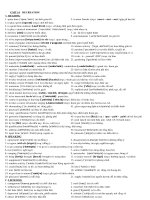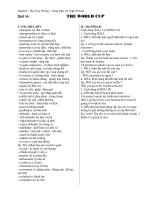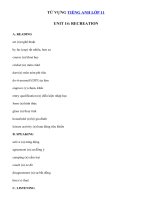TỪ VỰNG TOEIC unit 14
Bạn đang xem bản rút gọn của tài liệu. Xem và tải ngay bản đầy đủ của tài liệu tại đây (263.95 KB, 62 trang )
Unit 14
CRYPT AB/ABS PED- TROP NEO NOV POS TEN MONO UNI Number
Words
Quiz 14-1 Quiz 14-2 Quiz 14-3 Quiz 14-4 Quiz 14-5 Review Quizzes 14
CRYPT comes from the Greek word for “hidden.” To encrypt a message is
to encode it—that is, to hide its meaning in code language. When a scientific
term begins with crypto-, it always means that there's something hidden about
it .
crypt
(1) A room completely or partly underground, especially under
the main floor of a church. (2) A room or area in a large aboveground tomb.
• His old nightmare was of being locked in a crypt with corpses as his only
companions.
Hidden under the main floor of a great church is often a large room, often
with a tomb as its centerpiece. Many major European churches were built
over the remains of a saint—the Vatican's great St. Peter's Basilica is an
example—and instead of having the coffin buried, it was often given its
spacious room below ground level. In a large aboveground tomb, or
mausoleum, there may be several small chambers for individual coffins, also
called crypts; when the comic book Tales from the Crypt made its first
appearance in 1950, it was this meaning that the authors were referring to.
encrypt
code.
(1) To convert into cipher. (2) To convert a message into
• Messages on the group's Web site are encrypted in code words to keep lawenforcement agents from understanding them.
Codes aren't always in another language; people have always been able to
communicate in ways that conceal their real meaning. In countries ruled by
dictators, novelists and playwrights have sometimes managed to encrypt their
messages, conveying political ideas to their audiences so that the authorities
never notice. But encryption today usually refers to a complex procedure
performed on electronic text to make sure the wrong people—whether a
nation's enemies or a business competitor (most businesses use encryption
today)—can't read it. And sensitive data that merely resides on a company's
own computers is often encrypted as well.
cryptic
conceal.
(1) Mysterious; puzzlingly short. (2) Acting to hide or
• From across the room, Louisa threw Philip a cryptic look, and he puzzled
over what she was trying to tell him.
Until the writing on the famous Rosetta Stone was finally translated in the
early 19th century, Egyptian hieroglyphic writing was entirely cryptic, its
meaning hidden from the modern world. In the same way, a cryptic comment
is one whose meaning is unclear, and a cryptic note may leave you
wondering. Cryptic coloring among plants and animals acts like camouflage;
so, for example, some moths that are tasty to blue jays are cryptically colored
to look like bugs that jays won't touch.
cryptography
decoding of messages.
(1) Secret writing. (2) The encoding and
• As a graduate student in mathematics, she never dreamed she would end up
working in cryptography for the Defense Department.
During World War II, cryptography became an extremely complex science
for both the Allied and Axis powers. The Allies managed to secretly crack
the code produced by the Nazis' Enigma machine, and thereby may have
shortened the war by two years. The Axis cryptographers, on the other hand,
never managed to crack the Americans' ultimate code—the spoken languages
of the Navajo and other American Indians. In the age of computers,
cryptography has become almost unbelievably complex; it's widely used in
peacetime in such areas as banking telecommunications.
AB/ABS comes to us from Latin, and means “from,” “away,” or “off.” Abuse
is the use of something in the wrong way. To abduct is to “lead away from”
or kidnap. Aberrant behavior is behavior that “wanders away from” what is
acceptable. But there are so many words that include these roots that it would
be absurd to try to list them all here.
abscond
To depart in secret and hide.
• They discovered the next morning that their guest had absconded with most
of the silverware during the night.
Wagner's massive four-part opera The Ring of the Nibelung begins with a
dwarf absconding with gold which he turns into a magic ring. And in J. R. R.
Tolkien's The Hobbit, Bilbo Baggins absconds from Gollum's caves with the
ring he has found, the ring Gollum calls “my precious”; what follows is
detailed in the three-volume Lord of the Rings. (Tolkien knew Wagner's
opera well.) A young couple might abscond from their parents to get married,
but sooner or later they must face those parents again.
abstemious
food or alcohol.
Restrained, especially in the consumption of
• Her parents had left her two million dollars when they died, having been so
abstemious for years that their neighbors all assumed they were poor.
Many 14th-century monks lived by the Rule of St. Benedict, which demands
an abstemious life of obedience and poverty. But not all monks could
maintain such abstemious habits. Chaucer's Canterbury Tales contains a
portrait of a fat monk who is supposed to follow a vegetarian diet but instead
is an enthusiastic hunter who loves a juicy swan best. He justifies breaking
the Rule by saying that it's old-fashioned and that he's just keeping up with
modern times. Abstemious itself has a slightly old-fashioned sound today,
especially in a country where everyone is constantly encouraged to consume.
abstraction
The consideration of a thing or idea without
associating it with a particular example.
• All the ideas she came up with in class were abstractions, since she had no
experience of actual nursing at all.
From its roots, abstraction should mean basically “something pulled or
drawn away.” So abstract art is art that has moved away from painting
objects of the ordinary physical world in order to show something beyond it.
Theories are often abstractions; so a theory about economics, for instance,
may “pull back” to take a broad view that somehow explains all of economics
(but maybe doesn't end up explaining any of it very successfully). An
abstract of a medical or scientific article is a one-paragraph summary of its
contents—that is, the basic findings “pulled out” of the article.
abstruse
Hard to understand; deep or complex.
• In every class he fills the blackboard with abstruse calculations, and we
usually leave more confused than ever.
The original meaning of abstruse, coming almost straight from the Latin, was
“concealed, hidden.” It's easy to see how the word soon came to describe the
kind of language used by those who possess certain kinds of expert
knowledge (and don't necessarily want to share it with other people).
Scientific writing is often filled with the kind of abstruse special vocabulary
that's necessary for exact and precise descriptions. Unfortunately, the
language of a science like quantum physics can make an already difficult
subject even more abstruse to the average person.
Quiz 14-1
A. Match the definition on the left to the correct word on the right:
1. mysterious
a. encrypt
2. code writing
b. abstraction
3. translate to code c. abscond
4. difficult
d. cryptic
5. tomb
e. abstruse
6. generalization f. crypt
7. self-controlled g. cryptography
8. flee
h. abstemious
Answers
B. Fill in each blank with the correct letter:
a. cryptic
b. abscond
c. abstraction
d. crypt
e. cryptography
f. abstemious
g. encrypt
h. abstruse
1. She had failed to ___ the file when she put it on her hard drive, and her
secretary had secretly copied it.
2. His answer was so short and ___ that I have no idea what he meant.
3. The great, echoing ___ of St. Stephen's Cathedral could have held
hundreds of people.
4. That's a clever ___, but in the real world things work very differently.
5. The ___ vocabulary of the literature professor led many students to drop
her class.
6. He's given up drinking and leads an ___ life these days, rarely thinking
about his former high living.
7. Their ___ hasn't been revised in two years, and we've been worried about
the security of the data.
8. The bride is so shy that her mother fears she'll ___ from the reception.
Answers
PED- comes from the Greek word for “child.” The same root also has the
meaning “foot” (see PED), but in English words it usually isn't hard to tell the
two apart.
pedagogy
The art, science, or profession of teaching.
• His own pedagogy is extremely original; it sometimes alarms school
officials but his students love it.
Since in Greek agogos means “leader,” a paidagogos was a slave who led
boys to school and back, but also taught them manners and tutored them after
school. In time, pedagogue came to mean simply “teacher”; today the word
has an old-fashioned ring to it, so it often means a stuffy, boring teacher. The
word pedagogy, though, is still widely used, and often means simply
“teaching.” And pedagogic training is what everyone majoring in education
receives.
pedant
(1) A formal, unimaginative teacher. (2) A person who
shows off his or her learning.
• At one time or another, every student encounters a pedant who can make
even the most interesting subject tedious.
It isn't always easy to tell a pedantic teacher from one who is simply
thorough. Some professors get an undeserved reputation for pedantry from
students who just don't like the subject much. Regardless of that, a pedant
need not be a teacher; anyone who goes around displaying his or her
knowledge in a boring way can qualify.
pediatrician
A doctor who specializes in the diseases,
development, and care of children.
• Children in the U.S. usually see a pediatrician until they turn at least 15 or
16.
Since iatros means “physician” in Greek (see IATR), words such as pediatric
naturally refer to “children's medicine.” Pediatrics is a fairly new medical
specialty; until about 1900, children were considered small adults and given
the same medical treatment, only milder. Benjamin Spock was the most
famous pediatrician of the 20th century, and his book Baby and Child Care
changed the way millions of Americans raised their children.
encyclopedic
(1) Of or relating to an encyclopedia. (2)
Covering a wide range of subjects.
• Someone with the kind of encyclopedic knowledge she has should be
competing on Jeopardy.
In Greek, paidaea meant not simply “child-rearing” but also “education,” and
kyklios meant “general”; thus, an encyclopedia is a work broad enough to
provide a kind of general education. The world's most eminent general
encyclopedia, the Encyclopaedia Britannica, is a huge work that covers every
field of human knowledge. But encyclopedic doesn't have to refer to books;
it's often used to describe the wide-ranging knowledge that certain types of
minds just can't stop acquiring.
TROP comes from the Greek tropos, meaning “turn” or “change.” The
troposphere is the level of the atmosphere where most weather changes—or
“turns in the weather”—occur. And the Tropics of Cancer and Capricorn are
the lines of latitude where the sun is directly overhead when it reaches its
northernmost and southernmost points, on about June 22 and December 22
every year—that is, the point where it seems to turn and go back the other
way.
tropism
Automatic movement by an organism unable to move
about from place to place, especially a plant, that involves turning or growing
toward or away from a stimulus.
• The new president was soon showing a tropism for bold action, a tendency
that seemed more the result of instinct than of careful thought.
In hydrotropism, a plant's roots grow in the direction of increasing moisture,
hoping to obtain water. In phototropism, a plant (or fungus) moves toward
light, usually the sun—perhaps because, in the colder climates where such
plants are usually found, concentrating the sun's warmth within the sunseeking flower can create a warm and inviting environment for the insects
that fertilize it. In thigmotropism, the organism moves in response to being
touched; most climbing plants, for example, put out tiny tendrils that feel
around for something solid and then attach themselves or curl around it.
When microbiologists talk about tropism, however, they're often referring
instead to the way a virus will seek out a particular type of cell to infect. And
when intellectuals use the word, they usually mean a tendency shown by a
person or group which they themselves might not even be aware of.
entropy
(1) The decomposition of the matter and energy in the
universe to an ultimate state of inactive uniformity. (2) Chaos, randomness.
• The apartment had been reduced to an advanced state of entropy, as if a tiny
tornado had torn through it, shattering its contents and mixing the pieces
together in a crazy soup.
With its Greek prefix en-, meaning “within,” and the trop- root here meaning
“change,” entropy basically means “change within (a closed system).” The
closed system we usually think of when speaking of entropy (especially if
we're not physicists) is the entire universe. But entropy applies to closed
systems of any size. Entropy is seen when the ice in a glass of water in a
warm room melts—that is, as the temperature of everything in the room
evens out. In a slightly different type of entropy, a drop of food coloring in
that glass of water soon spreads out evenly. However, when a nonphysicist
uses the word, he or she is usually trying to describe a large-scale collapse.
heliotrope
white or purple flowers.
Any of a genus of herbs or shrubs having small
• A long bank of purple heliotrope lined the walkway, and her guests were
always remarking on the flowers' glorious fragrance.
Helios was the god of the sun in Greek mythology, and helio- came to appear
in a number of sun-related English words. The genus known as the
heliotropes consists of about 250 species; many are thought of as weeds, but
the best-known species, garden heliotrope, is a popular and fragrant perennial
that resembles the forget-me-not. The heliotrope tends to follow the sun—
that is, turn its blossoms toward the sun as it travels from East to West every
day. But the fact is, heliotropism—turning toward the sun—is common
among flowers (and even leaves), and some, like the sunflower, are more
dramatically heliotropic than the heliotrope. Those in the far North actually
use their petals to reflect the sun's heat onto the flower's central ovary during
the short growing season.
psychotropic
Acting on the mind.
• My mother is taking two drugs that may produce psychotropic side effects,
and I'm worried that they might be interacting.
Psychotropic is used almost always to describe substances that we consume.
Such substances are more numerous than you might think, and some have
been known for thousands of years. Native American religions, for example,
have used psychotropic substances derived from certain cactuses and
mushrooms for centuries. Caffeine and nicotine can be called psychotropic.
Psychotropic prescription drugs include antidepressants (such as Prozac) and
tranquilizers (such as Valium). Any medication that blocks pain, from aspirin
to the anesthetics used during surgery, can be considered a psychotropic drug.
Even children are now prescribed psychotropic drugs, often to treat attention
deficit disorder. And all recreational drugs are psychotropic. Psychoactive is
a common synonym of psychotropic.
Quiz 14-2
A. Indicate whether the following pairs of words have the same or
different meanings:
1. psychotropic / mind-altering
same ___ / different ___
2. encyclopedic / important
same ___ / different ___
3. entropy / disorder
same ___ / different ___
4. heliotrope / sunflower
same ___ / different ___
5. pediatrician / foot doctor
same ___ / different ___
6. tropism / growth
same ___ / different ___
7. pedagogy / teaching
same ___ / different ___
8. pedant / know-it-all
same ___ / different ___
Answers
B. Match the definition on the left to the correct word on the right:
1. thorough
a. entropy
2. decay
b. pediatrician
3. boring teacher
c. heliotrope
4. fragrant flower
d. encyclopedic
5. automatic motion e. tropism
6. education
f. pedant
7. affecting the mind g. psychotropic
8. children's doctor h. pedagogy
Answers
NEO comes from the Greek neos, meaning “new.” Neo- has become a part of
many English words. Some are easy to understand; for example, neo-Nazi.
Some are less so; you might not immediately guess that neotropical means
“from the tropics of the New World,” or that a neophyte is a “newcomer.”
When William Ramsay discovered four new gases, he named them all using
Greek roots that at first glance might sound slightly mysterious: argon
(“idle”), krypton (“hidden”), xenon (“strange”)—and neon (“new”).









